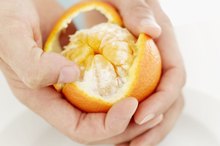How to Freeze Nectarines
Commonly used as a substitute for peaches, the only significant aesthetic difference is that nectarines aren’t fuzzy. Nutrition-wise, “Nectarines provide twice the vitamin A, slightly more vitamin C, and much more potassium than peaches,” according to the University of Rhode Island, making them a healthier choice of fruit for cobblers, crisps and other fruit filled desserts 3. With a little prep-work, you can freeze nectarines to prevent them from spoiling before you can use them.
Mix 3 cups of sugar into 4 cups of lukewarm water and stir to dissolve the sugar rendering a thick syrup. Prepare the syrup in the airtight plastic container you plan on freezing the fruit in.
How to Marinate Strawberries
Learn More
Add 1/2 tsp. ascorbic acid for every quart of syrup. This will help to prevent the fruit from darkening.
Chill the syrup in the refrigerator for at least 30 minutes.
How to Bake Candied Lemon Slices in an Oven
Learn More
Wash the nectarines under cool to lukewarm running water.
Peel the nectarines with a peeler or small knife and cut away any imperfections.
Slice the nectarines into slices of desired thickness. Slicing the nectarines is optional as they can be frozen whole.
Place the nectarines into the syrup gently pressing them down to submerge them completely.
Close the lid making sure to leave an inch of space at the top of the container.
Label the container with the current date by writing on it with a dark-inked marker or by attaching a homemade label.
Place the nectarines into a level space in the freezer and prevent moving them until they solidify.
Tips
Use or discard the nectarines before 12 months.
Related Articles
References
- University of Missouri Extension; Quality for Keeps: Freezing Fruits; Barbara J. Willenberg, et al.; June 2003
- National Center for Home Food Preservation: Freezing Peaches or Nectarines
- University of Georgia: Freezing Fruit
- Nectarine, raw. FoodData Central. U.S. Department of Agriculture. Published April 1, 2019.
- Vizzotto M, Cisnero-Zevallos L, Byrne DH, Ramming DW, Okie WR. Large variation found in the phytochemical and antioxidant activity of peach and plum germplasm. JASHS. 2007;132:3334-340. doi:10.21273/JASHS.132.3.334
- Noratto G, Porter W, Byrne D, Cisneros-Zevallos L. Identifying peach and plum polyphenols with chemopreventive potential against estrogen-independent breast cancer cells. J Agric Food Chem. 2009;57(12):5219-26. doi:10.1021/jf900259m
- Ramprasath VR, Jenkins DJ, Lamarche B, et al. Consumption of a dietary portfolio of cholesterol lowering foods improves blood lipids without affecting concentrations of fat soluble compounds. Nutr J. 2014;13:101. doi:10.1186/1475-2891-13-101
- American College of Allergy, Asthma and Immunology. Oral allergy syndrome. Updated March 21, 2019.
Tips
- Use or discard the nectarines before 12 months.
Writer Bio
Melynda Sorrels spent 10 years in the military working in different capacities of the medical field, including dental assisting, health services administration, decontamination and urgent medical care. Awarded the National Guardsman’s Medal for Lifesaving efforts in 2002, Sorrels was also a nominee for a Red Cross Award and a certified EMT-B for four years.









